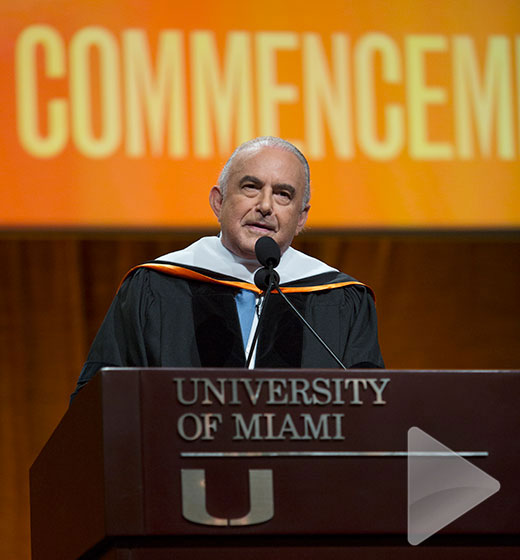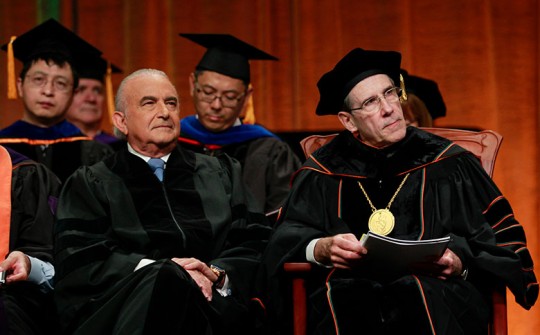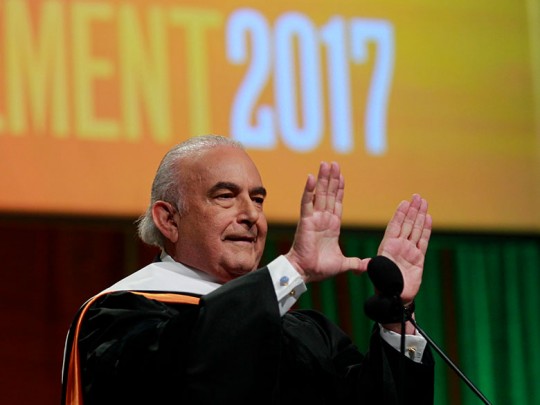Daring To Be Positive: A Commencement Speech by Gustavo Cisneros
My father, Gustavo, had the honor of delivering the University of Miami School of Administration and Engineering commencement address while also receiving an Honorary Doctorate in Humanities. It was wonderful to see my father’s lifetime achievements recognized through the Honorary Degree and great fun hearing  him address the graduating class. What follows is his speech – filled with business anecdotes and life lessons. Hope you enjoy it as much as we did!
Congratulations to the 2017 graduates and to my father! Go Cane’s.

Gustavo Cisneros’ Commencement Address
University of Miami
School of Business Administration and College of Engineering
May 12, 2017
Hola ‘canes! Gracias, Presidente Frenk y Edward por la generosa introducción. Presidente Frenk, Preboste LeBlanc, Miembros de la Junta Directiva, profesores, amigos y familia, y a la Clase del 2017.
It is an honor to be with you today, and not just to be with you, but to receive a degree with today’s graduates. The business students worked hard for this day. The engineering students worked REALLY hard. And all I have to do is give a speech.
I would like to start with a quote from a great Miami businessman and, in many ways, the poet of our time. He said: “Ask for money… and get advice. Ask for advice… get money twice.†Yes, I wanted to be the first graduation speaker to quote Pitbull.
Today, you are not asking for much at all. Except maybe a short graduation speech—which I will try to provide. But I do want to offer you a few pieces of advice to launch you on your career:
When you leave here, armed with a world-class education in business or engineering, you will be asked to build things, create things, disrupt things. To leave the world better than you found it. No one will make it easy for you. As you all know, sometimes you think you see a clear path ahead… and then you step in something a duck left behind. I may not be able to help you avoid the duck droppings, but I hope I can help you navigate the road ahead, by sharing some lessons from my own life.
Miami is a magnet for diverse ideas and experiences. The nexus of the Americas. A place that gives you a global outlook and an ability to go beyond borders of color, culture, and creed.
My family first came to these shores a long time ago. One of my ancestors, Pablo de Hita y Salazar, was a Spanish officer who served as the governor of Spanish Florida for four years in the 17th century. Back then, the borders of Florida stretched from here to Texas to South Carolina.For centuries, people of all backgrounds have been drawn to this city—for the same reason they are drawn to this school. Miami is a magnet for diverse ideas and experiences. The nexus of the Americas. A place that gives you a global outlook and an ability to go beyond borders of color, culture, and creed.
Today, our three children and ten grandchildren call Miami home. I am proud that our company, Cisneros, calls Miami home as well. My father started our family business in Caracas in 1929. At the time, he did not know that one day the company would be based in Miami. But even back then, he believed that good ideas could come from anywhere. He believed in the American spirit of openness, optimism, and hard work. With these values, he grew a small trucking company into the world’s largest bottler of Pepsi-Cola at the time. Likewise, he incorporated into his holdings other prosperous enterprises, such as Venevisión, the largest television network in Venezuela.
As a child, I was fascinated by the business, and I was glued to my father. Like many of you, I was bursting with ideas. I would see something and think: that is not right, we can do this better. One day my father stopped me and said: listen, it is okay to be a critic, but it is better to be a builder. And that is the first lesson I want to share with you today:
Sometimes, it is more difficult in business to be positive and constructive. It is much easier to be critical. Today, there are many forces encouraging—even demanding—that you plan for failure. You have risk managers. You have banks wanting to make sure you have enough capital to cushion a failure. Stockholders require plans for failure. And that is all important.
But when you approach every decision with a constructive attitude, you will not just see obstacles, you will see possibilities. I am a builder of businesses. And to build a business, you must be relentless in your search for the best solutions to the toughest problems.
Let me share an example from my own experience: In the 1990s, we partnered with an American company to bring DirecTV to Latin America. In the States, anyone who wanted satellite TV could visit a store and buy the equipment. But in Latin America… no one bought the equipment in stores and we were in bad shape.
Instead of giving up, we realized we needed a different sales model. Latin Americans were not familiar with satellite TV—so instead of expecting consumers to come to us, we had to come to them. We hired salespeople, and arranged demonstrations in busy areas. Sales went through the roof, and this method became the model for other countries in the region. It was a big lesson for me as a businessman. When people tell you “do it this way or fail,†do not accept that. Find the opportunity to make it better.
That brings me to the second lesson I want to share with you. Some good ideas might come to you in a flash of lightning. But most of them are the result of trial and error, collaboration, and a lot of hard work. So do not assume any task is beneath you. If someone asks you to run an errand, do it. If no one asks you, do it anyway.
Take pride in everything you do—because if you act like you are “too good,†you will never be great.
Take pride in everything you do—because if you act like you are “too good,†you will never be great.
Every day, I see the results of this kind of dedication and spirit of collaboration. The most successful TV executives at Cisneros are the ones who notice the studio floor needs sweeping, and grab a broom. If you are willing to work hard, to find the opportunities to make something better—whether you are coming up with a new sales model or sweeping the floor—you will inspire those around you, and you will find success.

Gustavo Cisneros and Julio Frenk
The final lesson I want to share with you is this:
Today, you should take time to reflect on what you have learned, what you have accomplished, and how you have changed. You have earned this day of celebration. But tomorrow, turn outward. Ask yourself not just who you are, but what you can offer. How will you make your mark? What can you contribute that no one else can?
In the case of my family, we have always believed that the private sector has a responsibility to the public. Today this is called “corporate social responsibility†or the “double bottom line.†But it was in our family DNA before it even had a name.
Remember those DirecTV satellites I told you about? They revolutionized communication—providing one signal for the entire continent. That meant we had a unique opportunity to reach millions of people. And we used it not just to bring entertainment. We also used it to build cl@se, the first pan-regional Spanish-language educational channel. Cl@se allowed teachers and students to access educational programming, across South America to the South Pole. We did this because we wanted to give back to the community.
So everything you do to strengthen your community also strengthens you.
But we also did it because strong businesses depend on strong ecosystems—which in turn depend on an educated public, and a robust, dynamic society. Now more than ever, especially with the power of social media, our world is interconnected—and our futures are intertwined. So everything you do to strengthen your community also strengthens you.
I know I do not have to tell you about the importance of working for the social good. You have spent the past four years putting your immense talent to use.
- You as a class hosted “Introduce a Girl to Engineering Day.â€
- You organized efforts to clean up the shores of South Florida.
- You helped Dominican entrepreneurs start their businesses.
- You developed plans to help Peruvian farmers to distribute their crops.
- You have promoted a vibrant civil society, here and abroad—and you should be proud of all you have done.
In my home country, mi querida Venezuela, and in other countries where freedom and democracy are at risk, a vibrant civil society cannot be taken for granted. That makes it even more important for private citizens and companies to be a force for public good.
As you know, Venezuela is in a precarious position right now. It is at a breaking point. There’s no dialogue, there’s no middle ground to be found. Over the years, we have consistently turned down offers to purchase our TV network. We made a decision not to sell the network – despite the fact that it has lost money for a decade. Why? Because open discourse matters, because the 2,000 people that work for us and their families depend on us, and because material value is not the only type of value. And if you want material value, you must also embrace deeper values.
Now more than ever, our job at the network is to inform with discipline, and provide a real window for everybody in Venezuela. Our long term objective is twofold: first, to survive. Second, to rebuild.
The reason I am sharing this story with you is because wherever you end up, I hope you will remember that your obligation is never only to customers, shareholders, or bosses. Your obligation is to your community—because without a strong community, no business can survive. What I have shared with you today may seem like a tall order. But I know you are up to the challenge.
To summarize:
- In the years ahead, dare to be positive even in the bleakest times.
- Never be too good to make something better.
- Fight for your values, and your community.
This world will be shaped by your vision, your imagination, and your ideals. You have tools like never before. Training like never before. And opportunities like never before. This is your time.
Agradezco mucho haber estado con ustedes hoy.
Thank you. Thank you. Thank you. And congratulations, Class of 2017!

